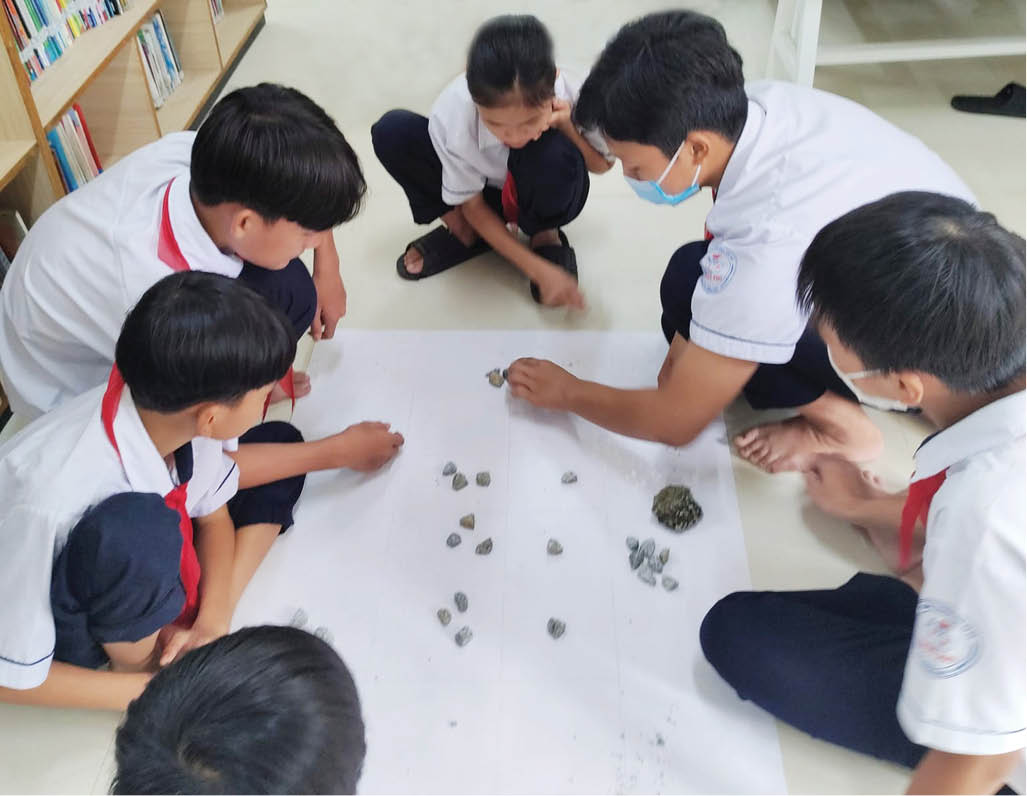
Students of Thuy Phu Secondary School playing “Ô ăn quan”
I stumbled upon a special sight at a school in the suburbs. As the recess drum sounded, the students rushed to the yard to play Nhảy ô tiếp sức (Vietnamese version of Hopscotch), Blind man’s bluff, and other Vietnamese folk games such as “Trồng hoa, Trồng nụ” or “Ô ăn quan”… Folk games, thought to be strange to students of modern time, are being revived right at schools and classes.
Regardless of the era, folk games are very diverse, so the materials for these games can be easily found everywhere. With just one piece of chalk, brick, some big and small pebbles, and a plot of yard, the children could have an extremely fun and interesting playing session.
Even students who are more reserved and quieter than their classmates could become bolder and more confident while participating in these games... The schoolyard is filled with laughter, voices, and cheers.
Nguyen Ngoc Quynh, a Thuy Phu Secondary School (Huong Thuy town) student, said: “The folk games are fascinating. We've been looking forward to these games since we first tried them out. I am really happy that I get to go to school, learn, and play these with my friends every day.”
Mr. Ngo Hoang Giang, Principal of Thuy Phu Secondary School (Huong Thuy town), shared: “Our program includes folk games as part of the effort to keep our students away from the “virtual world”. The folk games in school are simple, easy to implement, inexpensive, and not picky about locations. Students are trained physically, and many games contribute to the education of communication skills, cooperation, organization, and quick thinking. Through these extracurricular activities, the school can learn about the thoughts and feelings of the students, and then devise appropriate educational measures from there.”
Until now, the majority of primary and secondary schools in Thua Thien Hue province have been actively collecting and integrating folk games into their extracurricular activity plans. Since then, the number of folk games has increased. Schools have divided their yards into sections with different games that children can play during recess, attracting a large number of students to gleefully participate.
The principal of Tran Cao Van Secondary School, Ms. Tran Lan Phuong, stated: “We discover that folk games have positive effects during their trial runtime. Students are happy, laughing, exchanging and interacting with each other while participating in the games. It also benefits their physical health. Folk games have made the school grounds rich and diverse while also helping to preserve traditional cultural values. Even though the rules and the way to play the folk games today have evolved in the direction of being more modern or simplified, their good cultural aspects still remain.”
The organization of folk games in schools not only creates a healthy playground, but also contributes to the effective and extensive implementation of the emulation movement “Building friendly schools, active students”. In the coming time, the Department of Education and Training of Thua Thien Hue will continue to ask schools to provide appropriate spaces for incorporating folk games into school or class meetings, extracurricular activities sessions, and physical education classes. Schools are even encouraged to incorporate some folk games into future sports competitions. In addition, teachers in charge of the school’s Youth Union will receive training on introducing new games to increase diversity and attract students.
However, due to a lack of space as well as instruction manuals, bringing folk games into school is still difficult and limited in some units.
In order to preserve and replicate the model of folk games into their curriculum, schools need to arrange appropriate space and incorporate them into extracurricular activities and physical educationclasses. Furthermore, it is necessary to foster and train a team of teachers of the school’s Youth Union to research and add more diverse games to make them diverse and profound.
The preservation, dissemination, and expansion of folk games in schools not only create a healthy playground and effectively implement the movement to build friendly schools and active students, but also contribute to enriching their childhoods and fosters a better understanding of the cultural identity of their nation.
Story and photo: AN NHIEN